I don’t want to further confuse people about the concepts of evolution, but this is kinda funny…

Africa + South America = T-Rex
This is really cool…
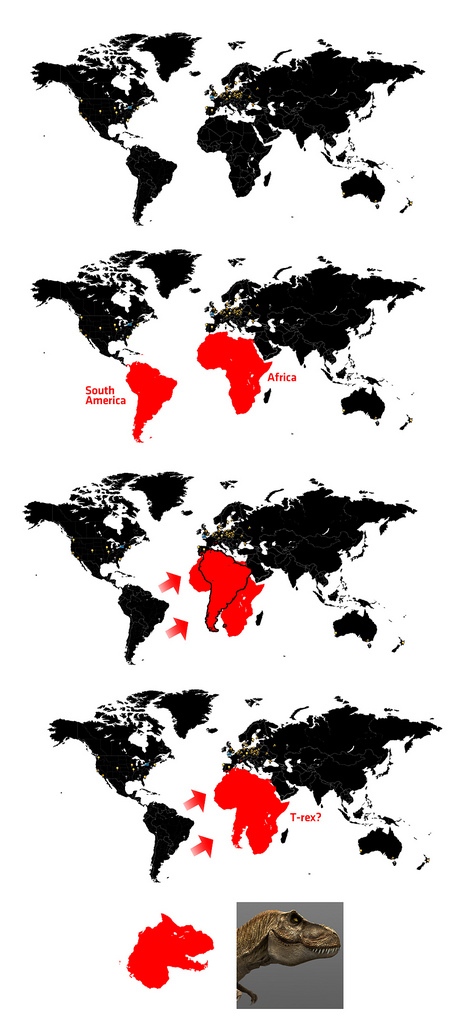
Extreme close-up of salt and pepper

This is a pretty cool extreme close up of a grain of salt and a peppercorn. It was taken using an electron scanning microscope and the original was in black and white – it was coloured digitally. Still pretty cool. Source
South Africa’s road network is being allowed to fall apart
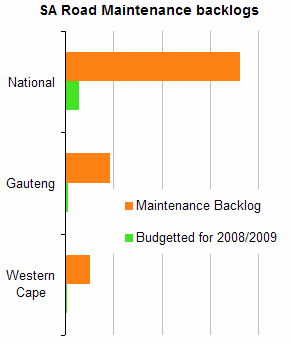
South Africa has huge backlogs on required roads maintenance. However, the currently allocated money is nowhere near meeting the needs. That means that we are falling further and further behind and unless something really drastic is done our roads will be as bad as our electricity.
Infrastructure is a tricky thing for politicians. It costs a lot to build and maintain infrastructure, but it’s normally one of those things that you don’t notice till it’s gone. Stupid politicians often don’t bother with infrastructure which won’t be noticed for years when they can use the money to win votes now.
That, to the dismay of many, has been happening in South Africa for a while. In 1994 the ANC took over and they did a great job as a transitional government – South Africa got through that little part of history wonderfully. But anyone who reads this blog will know that I think the ANC are rubbish at governing a running country.
One of the things that the ANC are worst at is maintaining our national infrastructure. So we are already in deep trouble with electricity, our rail networks are nowhere near what they should be, and our roads are falling apart.
Jeff Radebe (Transport Minister) has just released information (after being hounded by the DA) on just how bad things are with our roads – see the graph above. Basically he said that we are miles behind on road maintenance and that at current rates we will never catch up. In other words unless something drastic is done South Africa’s road network will completely collapse!
One of South Africa’s biggest problems is that the ANC can do anything without worrying about the results of the next election. They are a terrible government largely because they don’t have to worry. I wish that there was a possibility of them losing an election.
Jeremy Clarkson on South Africa’s power cuts
 Jeremy Clarkson is a funny guy. He is one of the presenters on a surprisingly cool car show called Top Gear – check it out, it’s really entertaining.
Jeremy Clarkson is a funny guy. He is one of the presenters on a surprisingly cool car show called Top Gear – check it out, it’s really entertaining.
Anyway, he is an outspoken fellow and his blogs and books are also often entertaining. He recently wrote an article about how dependent modern society is on electricity. He got the idea while he was over here in South Africa and got some first hand experience…
From the article:
“Thirty years ago in South Africa, there was white power. Then there was black power. And now there is no power.
No really. There isn’t. The electricity-generating company over there has just announced that the power stations are not capable of meeting demand and that there will be outages for two, three or six hours a day for at least the next seven years.
So far as I can see, no one is asking why this has happened. Everyone suspects it’s because the power company, since it took over the reins from De Boer Pik Racist, has been operating a policy of only employing black people. So the whites, the ones who know how to run a power station, have left the job of generating electricity to a bunch of guys who don’t know how to.
No one’s actually saying that of course. It’s a political potato so hot that you’re going to get your fingers burned if you even whisper such a thing. And anyway, working out why the country’s run out of juice is nowhere near as important as working out what the bloody hell you can do about it.”
Later on in the article:
And if you want a generator, you’d better have nice tits and loose morals because frankly, that’s the only way you’re going to get one.
The Economist on the stupid American skilled immigration policy
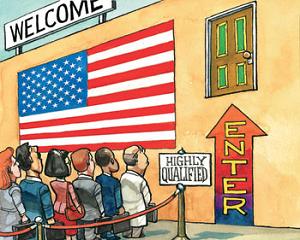
The Economist has an article about how those silly Americans are shooting themselves in the foot by preventing talented immigrants from getting in. This is something that I have personally encountered and I have to agree with The Economist – it’s pretty dumb.
America is in the enviable position of being the goal destination for thousands of the world’s most talented people. That is a position that other countries would love to be in. Indeed America’s restrictive laws and the efforts of Europe, Canada, and Australia are starting to suck talent and companies out of America.
Each year only 85,000 H1B visas for highly skilled and company sponsored immigrants are allowed. This is so far below the demand that they are all gone on the first day. Remember that these are people who would really add to the American economy:
- Almost 25% of American Nobel prize winners are immigrants
- Great American companies like Google and Intel had immigrants among their founders
- 40% of America’s science and engineering PhDs go to immigrants
- Bill Gates (and several economists) have calculated that on average each foreigner who receives an H1B visa creates jobs for 5 Americans
So why do American politicians shoot their country in the foot like this? Because those politicians are elected by a largely ignorant and isolationist public. These guys think that allowing some of the most talented and skilled workers to add to their economy is a bad idea.
Why the Chinese government might ban orange at the Olympics
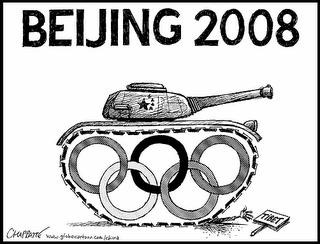 These days security is always an important aspect of major events and the Olympics are no exception. But for the authoritarian Chinese government, security at the 2008 Beijing Olympics must be taken to a whole new level.
These days security is always an important aspect of major events and the Olympics are no exception. But for the authoritarian Chinese government, security at the 2008 Beijing Olympics must be taken to a whole new level.
This is because the harsh Chinese government tries, with unfortunate success, to control the thoughts and opinions of their public. Like Orwell’s thought police the Chinese government control media and even the internet in attempts to control their public. There is no such thing, indeed nothing like, freedom of speech in China. It is a restrictive and often inhumane regime.
So how are they going to handle a massive influx of people, athletes and especially press that are used to being free to air their opinions? Nobody is really sure, but the Chinese are already having significant problems. The Olympic torch is being constantly disrupted by those who want to speak up against China’s dodgy policies – especially in Tibet.
Recently Bjork shocked officials by called out “Tibet, Tibet” during a performance in Shanghai. Their reaction? All foreign performers are now checked out first, playlists are carefully vetted and all impromptu features like encores are banned. Even child performers are scrutinized.
If that seems crazy consider the fact that dress code for spectators at the Olympics will also be vigorously enforced. Officials worry that innocently dressed spectators could raise a shirt to display slogans offensive to the regime. Security will probably be checking everything people wear. The response from protesters has been to say that fans should wear orange to show support for Tibet. Imagine the anguish of Dutch fans if the Chinese were to ban orange clothing at all Olympic events.
This may seem ridiculous to us, but imagine living there…
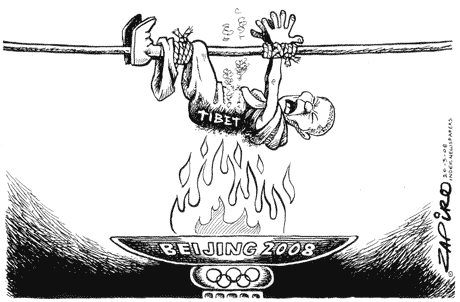
Will Morgan Tsvangirai give back the farms stolen by Mugabe?
Bob Mugabe is a bad guy. He has really brought Zimbabwe to it’s knees and almost anything or anyone would be better than him. And it is starting to look like Zim may soon be rid of him, but how much do we know about the new guy, Morgan Tsvangirai?
That is a question asked in a recent Economist article. Nobody really knows what he will do, but The Economist does have some information on his plans:
- He plans to focus on saving the economy. Stop printing money (to slow inflation), scrap price and foreign exchange controls and bring back market forces
- Farms confiscated from white farmers by Mugabe’s cronies will not all be given back, but farmers will supposedly be reasonably compensated. It’s not entirely clear what will happen on this crucial issue
- The MDC want to amend or replace the constitution in order to limit presidential powers
He would undoubtedly be an improvement on Mugabe, but would Tsvangirai be a good president? The Economist also lists a few worrying points:
- Tsvangirai does also have an autocratic bent. In 2005 he flouted a decision by his party and did his own thing causing a split in the party
- He has also been criticized for ignoring violence within the ranks of the MDC
We don’t know what Tsvangirai will be like – but it seems certain he will be an improvement on Bob
From The Economist to lightning balls to 1930s comics to World War 2 fighter pilots to UFOs to Dave Grohl to the Foo Fighters
 I recently read an unusual article in The Economist about a controversial phenomenon known as ball lightning. Basically ball lightning is a rare and unpredictable phenomenon where lightning forms a glowing ball which can persist and move around for several seconds rather than the normal flash.
I recently read an unusual article in The Economist about a controversial phenomenon known as ball lightning. Basically ball lightning is a rare and unpredictable phenomenon where lightning forms a glowing ball which can persist and move around for several seconds rather than the normal flash.
Ball lightning appears to be inconsistent in color (pale blue, yellow, green, red and white), size (pea sized to several meters) and behavior (dropping form the sky, moving along the ground, and sometimes nailing people).
Yeah it sounds like bull, but they have been seen thousands of times by thousands of witnesses over the last few centuries. Several scientific groups are working on explaining ball lightning. Hell, even The Economist (normally very skeptical) has written a detailed article about the studies attempting to explain them.

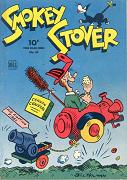 Wikipedia has a detailed article on lightning balls which mentions that they were often sighted by fighter pilots during World War 2. Now we need a little aside: early in the war poorly trained Japanese pilots often flew erratic trajectories and the Allied pilots developed a derogatory term for them – foo fighters. The name came from a comic strip popular at the time, Smokey Stover, which often made use of the nonsense word foo.
Wikipedia has a detailed article on lightning balls which mentions that they were often sighted by fighter pilots during World War 2. Now we need a little aside: early in the war poorly trained Japanese pilots often flew erratic trajectories and the Allied pilots developed a derogatory term for them – foo fighters. The name came from a comic strip popular at the time, Smokey Stover, which often made use of the nonsense word foo.
 So when the pilots repeatedly saw the erratically moving balls of fire they became known as foo fighters. Because lightning balls (foo fighters) were/are largely unexplained a lot of people think that they are UFOs (rubbish). Someone who is fascinated by UFOs is Dave Grohl who therefore chose the name for his band the Foo Fighters.
So when the pilots repeatedly saw the erratically moving balls of fire they became known as foo fighters. Because lightning balls (foo fighters) were/are largely unexplained a lot of people think that they are UFOs (rubbish). Someone who is fascinated by UFOs is Dave Grohl who therefore chose the name for his band the Foo Fighters.
It’s like the whole 6 degrees idea but for concepts instead of people. Awesome.
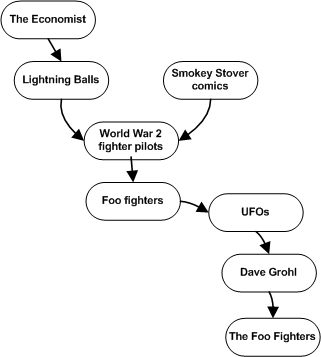
The Economist on private education
 The Economist recently published an article on private schools. It focuses on schools and data from Britain, but I think that a lot of what is said is generally applicable.
The Economist recently published an article on private schools. It focuses on schools and data from Britain, but I think that a lot of what is said is generally applicable.
The first part of the article discusses how extremely expensive private schools are getting (this is something that is true in South Africa too). However in Britain it seems that there are good returns on paying for private education:
- Those who left private schools earned on average 35% more than those who left public schools
- Only about half of this gain was attributed to a better background (contacts, intelligence, etc)
The researchers used some more analysis and research to figure out how private schools achieve this benefit: better exam results. When they compared graduates from private and public schools with equal exam results their earnings were the same!
So it seems that if you can get your kids to achieve good exam results, it doesn’t really matter what school they went to. Perhaps there is a cheaper way of achieving those results?
The end of the article discusses a survey of parents who sent their bright kids to ordinary schools with excellent results:
- The more average schools paid special attention to their talented students, going out of their way to extend and assist them
- However, this result does appear to depend on parents playing an active part in their children’s education